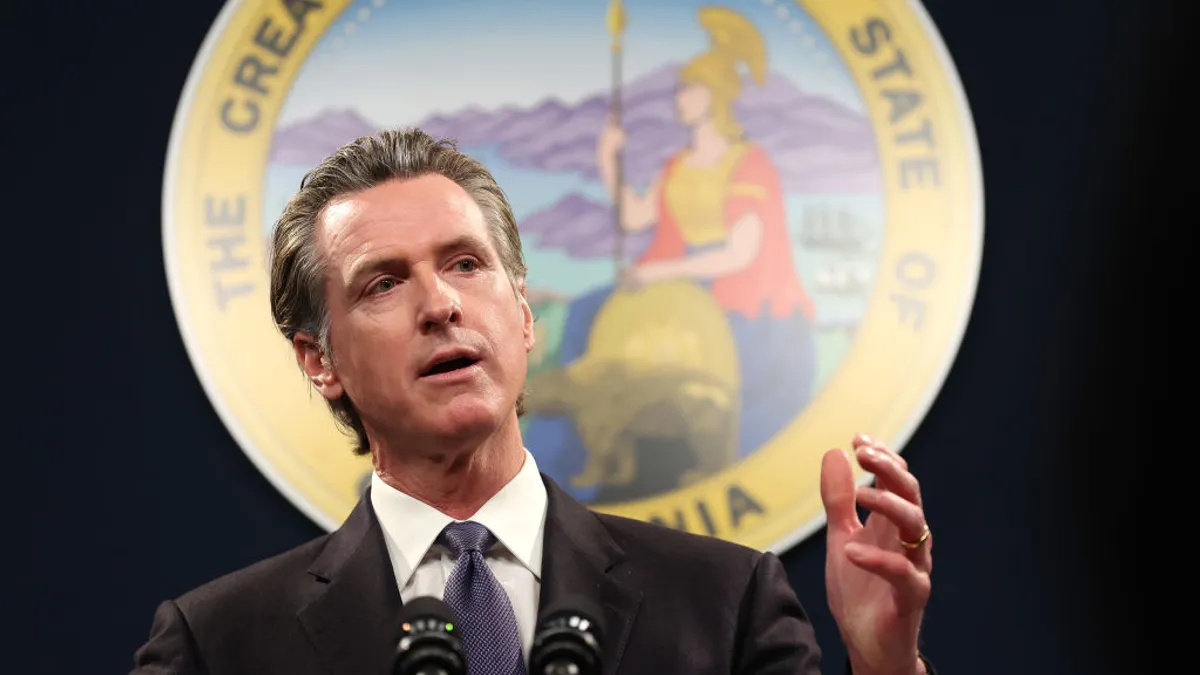California Gov. Gavin Newsom vetoed multiple waste and recycling-related bills, including legislation about hauler franchise agreements, a plastic gift card ban and several items related to last year’s landmark SB 54 extended producer responsibility law.
Newsom vetoed the bills on Oct. 8, saying they were unnecessary, duplicative of existing programs or could cause harm to small businesses. He has not yet acted on another notable piece of legislation that would add juice containers to the state’s container redemption program. On Oct. 10, he signed a right-to-repair bill that recyclers see as a way to divert more electronics from disposal.
Newsom has until Saturday to either sign or veto the remaining legislation, or allow it to become law without his signature. A two-thirds vote in both the state Assembly and Senate is needed to override a veto, but it’s unclear whether the following bills have the support necessary.
Here’s a look at some of those bills:
Vetoed bill: SB 751, addressing hauler franchise agreements and labor disputes
The bill was meant to prohibit local jurisdictions from entering into or updating a solid waste hauling agreement if a labor dispute would excuse the hauler from carrying out its duties. Labor disputes are sometimes included in haulers’ “force majeure” clauses that exempt them from fulfilling certain obligations during extraordinary events such as floods or fires. The bill was prompted by a 2021 labor dispute between Teamsters Local 542 and Republic Services in Chula Vista.
Haulers with ongoing labor disputes in the state would have needed to offer certain amends for disrupted service, such as refunds. WM, Waste Connections, Athens Services, and three state trade groups opposed the bill, but state municipal groups said it would help protect cities from liability.
Veto reason: Newsom doesn’t believe it’s necessary to change the state law, though he wrote in a veto letter that he appreciates the bill’s aim to prevent disruptions in local waste hauling services. “Local jurisdictions voluntarily enter into franchise agreements and currently have the ability to negotiate amendments to such contracts without legislation,” he wrote.
Vetoed bill: SB 665, creating a plastics working group
SB 665 would have established a working group to evaluate “novel” materials that could be used as alternatives to plastic in single-use products. It was meant to help the state implement some provisions laid out in last year’s SB 54, including a requirement that producers reduce the amount of single-use plastic they use by 25% by 2032. State Sen. Ben Allen, the sponsor of this bill, also sponsored SB 54, and work on SB 665 was designed to be complementary to prior SB 54 efforts.
The working group would have been tasked with delivering recommendations by July 2026 and would include members of state departments like CalRecycle.
Republic Services’ Western region, the National Stewardship Action Council and Rethink Waste were among the supporters. A coalition of recycling and packaging groups wanted more stakeholder voices represented in the working group, but weren’t listed as being formally opposed to the legislation.
Veto reason: Newsom considers the working group “unnecessary and duplicative of existing efforts.” CalRecycle is already in the process of gathering information needed to carry out the many provisions of SB 54, he said, including conducting needs assessments and industry surveys, as well as studies on waste characterization, source reduction and end markets, he wrote in a veto letter.
Vetoed bill: SB 303, an SB 54 “cleanup” bill
This bill aimed to clean up language and resolve several “ambiguities” from the original SB 54 bill text. One of the cleanup provisions in SB 303 has to do with adjudicating disputes between entities that are required to follow SB 54 regulations. It clarified that the arbitration process wouldn’t pause the producer responsibility organization’s implementation plans. The bill also called for minor clarifications to the bill’s definitions of “recycling” and “responsible end markets.”
Veto reason: Newsom says the bill would interfere with CalRecycle’s ability to meet certain regulatory deadlines. He suggests bill sponsors and stakeholders “work with CalRecycle through the regulatory process” to address the issues in the bill. State Sen. Ben Allen, the sponsor of this bill, also sponsored SB 54 and backed SB 665.
Vetoed bill: SB 728, banning plastic gift cards
SB 728 would have banned most kinds of plastic gift cards, which supporters saw as a minor way to help reach SB 54-specific plastic reduction goals. The majority of gift cards are made from PVC, which isn’t typically accepted for recycling. It would have prohibited most retailers from selling such gift cards starting in 2027.
Californians Against Waste was a main supporter, while Plastics and the California Chamber of Commerce were among the opposition.
Veto reason: Newsom said he was concerned the bill would negatively impact small businesses, adding that digital gift cards might not be feasible for some residents or businesses. He pointed out that the state has created other successful programs to reduce single-use plastics “while incentivizing businesses to transition towards more sustainable products and materials.” The legislature should consider “alternatives to a statutory, single-product ban” to help meet California's plastic waste reduction goals, he wrote in the veto letter.
Other vetoes to note:
- AB 1489: Specifies that compostable covered materials are not subject to SB 54’s source reduction requirements. Newsom said the bill would interfere with CalRecycle’s ability to meet statutory obligations by the January 2025 deadline.
- SB 777: Grocery and retail stores subject to the state’s single-use plastic bag ban would have had to provide a reusable bag return option and keep records of revenue received from the 10-cent bag fee. Newsom said the data collection and reporting requirement was too burdensome.
Editor’s note: This story has been updated to reflect that Gov. Newsom signed the right-to-repair bill for consumer electronics.



















